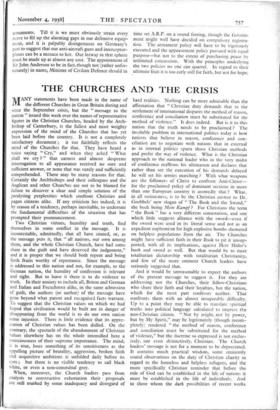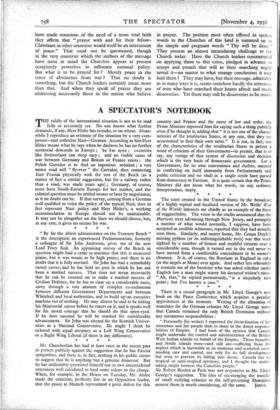THE CHURCHES AND THE CRISIS
MANY statements have been made in the name of the different Churches in Great Britain during and since the September crisis, but the " message to the nation " issued this week over the names of representative figures in the Christian Churches, headed by the Arch- bishop of Canterbury, is the fullest and most weighty expression of the mind of the Churches that has yet been laid before the country. It is not a completely satisfactory document ; it too faithfully reflects the mind of the Churches for that. They have heard a voice saying " Cry," and when they asked " What shall we cry ? " that earnest and almost desperate interrogation to all appearance received no sure and sufficient answer, or none that was surely and sufficiently comprehended. There may be many reasons for that. Certainly the Archbishops and their colleagues and the Anglican and other Churches are not to be blamed for failure to discover a clear and simple solution of the paralysing perplexities which confront Christian and pagan citizens alike. If any criticism lies indeed, it is by reason of a tendency, perhaps inevitable, to underrate the fundamental difficulties of the situation that has prompted their pronouncement.
Two Christian virtues, humility and truth, find themselves in some conflict in the message. It is incontestable, admittedly, that all have sinned, or, as the message puts it, that " all nations, our own among them, and the whole Christian Church, have had some share in the guilt and have deserved the judgement," and it is proper that we should both repent and bring forth fruits worthy of repentance. Since the message is addressed to this nation and not, for example, to the German nation, the humility of confession is relevant and right. But to leave it there is to do violence to truth. In their anxiety to include all, Briton and German and Italian and Frenchman alike, in the same admission of guilt, the authors (or author) of the message have gone beyond what patent and recognised facts warrant. To suggest that the Christian values on which we had hoped that civilisation would be built are in danger of disappearing from the world is to do our own nation some injustice. There is little evidence that its appre- ciation of Christian values has been dulled. On the contrary, the spectacle of the abandonment of Christian values elsewhere has on the whole intensified here a consciousness of their supreme importance. The mind, it is true, loses something of its sensitiveness as the appalling picture of brutality, aggression, broken faith and acquisitive ambitions is unfolded daily before its eyes ; but there is no visible tendency to call black white, or even a non-committal grey.
When, moreover, the Church leaders pass from analysis to constructive exhortation their proposals are still marked by some inadequacy and disregard of hard realities. Nothing can be more admirable than the affirmation that " Christian duty demands that in the settlement of international disputes the method of reason, conference and conciliation must be substituted for the method of violence." It does indeed. But is it to this nation that the truth needs to be proclaimed ? The insoluble problem in international politics today is how nations that believe in reason, conference and con- ciliation are to negotiate with nations that in external as in internal politics spurn those Christian methods and prefer the way of violence. What is the Christian approach to the national leader who in the very midst of conference reaffirms his ultimatum and declares that rather than see the execution of his demands delayed he will set his armies marching ? With what weapons are the followers of Christ to confront Anti-Christ- for the proclaimed policy of dominant sections in more than one European country is avowedly that ? What, in all seriousness, is to be the Christian answer to Dr. Goebbels' new slogan of " The Book and the Sword," the book being Mein Kampf ? For Christians the term " the Book " has a very different connotation, and one which little suggests alliance with the sword—even if the sword were used in its literal sense and not as an expedient euphemism for high explosive bombs showered on helpless populations from the air. The Churches might have sufficient faith in their Book to pit it unsup- ported, with all its implications, against Herr Hitler's book and sword as well. But that would be to meet totalitarian dictatorship with totalitarian Christianity, and few of the more eminent Church leaders have seriously suggested that.
And it would be unreasonable to expect the authors of the present message to suggest it. For they are addressing not the Churches, their fellow-Chi istians who share their faith and their loyalties, but the nation, which for the most part confesses neither. That confronts them with an almost insuperable difficulty. Up to a point they may be able to translate spiritual truths into political language calculated to impress the non-Christian citizen. " Not by might, nor by power, but by My Spirit," may be legitimately (though incom- pletely) rendered " the method of reason, conference and conciliation must be substituted for the method of violence," but the doctrine so expressed is not exclus- ively, nor even distinctively, Christian. The Church leaders' message is not for a moment to be depreciated. It contains much practical wisdom, some eminently sound observations on the duty of Christian charity in regard to the homeless and helpless refugees, and the more specifically. Christian reminder that before the rule of God can be established in the life of nations it must be established in the life of individuals. And to those whom the dark possibilities of recent weeks have made conscious of the need of a more vital faith they affirm that " prayer with and for their fellow- Christians in other countries would itself be an instrument of peace." That need not be questioned, though in the very countries which the authors of the message have most in mind the Churches appear at present completely powerless to influence national policy. But what is to be prayed for ? Merely peace in the sense of abstinence from war ? That no doubt is something, but the Church leaders certainly mean more than that. And when they speak of prayer they are addressing necessarily those in the nation who believe in prayer. The petition most often offered in spoken words in the Churches of this land is summed up in the simple and pregnant words " Thy will be done. They present an almost intimidating challenge to the Church today. Have the Church leaders concentrated on applying them to this crisis, pledged in advance to accept and preach that will as their searching might reveal it—no matter to what strange conclusions it may lead them ? They may have, but their message, admirable as in many ways it is, seems somehow hardly the utterance of men who have searched their hearts afresh and made discoveries. Yet there may still be discoveries to be made.











































 Previous page
Previous page